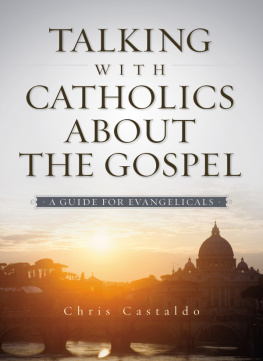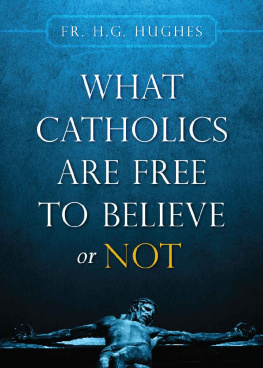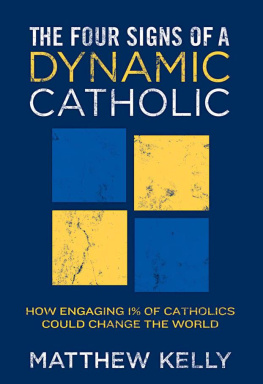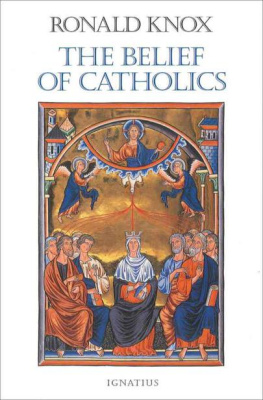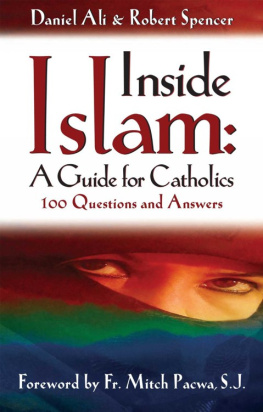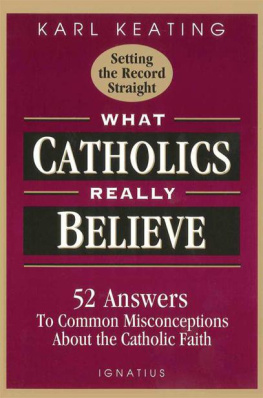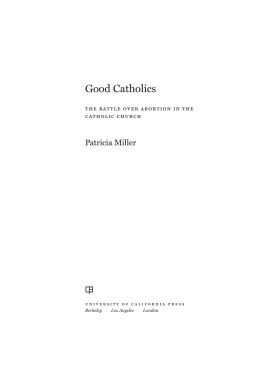About the Authors
William V. DAntonio (PhD 1958, Michigan State University) is a research fellow in the Institute for Policy Research and Catholic Studies at The Catholic University of America. He is coauthor of nine books and coeditor of four, including American Catholics Today (2007) and Voices of the Faithful (2007). Dr. DAntonio served on the faculty of the University of Notre Dame from 19591971, and served as professor and chair of the department from 19661971. He served as professor and chair of the department at the University of Connecticut from 19711976 and received emeritus professor status there in 1986. He also served as executive officer of the American Sociological Association from 1982 until his retirement in 1991. Since 1993 he has been a visiting research professor in sociology at Catholic University. In 2004 he was awarded an honorary Doctor of Humane Letters from St. Michaels College, and served as a Fulbright Senior Fellow in Italy. In 2008, The Center for the Study of Religion and Society, Department of Sociology, University of Notre Dame named its annual award to the centers outstanding graduate student in his honor. In 2009 he received the Rev. Louis J. Luzbetak Award for Exemplary Church Research from the Center for Applied Research in the Apostolate.
Michele Dillon (PhD 1989, University of California, Berkeley) is professor and chair of sociology at the University of New Hampshire. Her publications include In the Course of a Lifetime: Tracing Religious Belief, Practice and Change (coauthor Paul Wink; 2007), Catholic Identity: Balancing Reason, Faith, and Power (1999), Debating Divorce: Moral Conflict in Ireland (1993), Handbook of the Sociology of Religion (editor; 2003), Introduction to Sociological Theory (2010), and over fifty research articles, essays, and book chapters. Dr. Dillon is the current president of the Society for the Scientific Study of Religion. She has also served as chair of the American Sociological Association section on the sociology of religion, and as president of the Association for the Sociology of Religion. In 20112012, she was the JE and Lillian Byrne Tipton Distinguished Visiting Professor in Catholic Studies at the University of California, Santa Barbara.
Mary L. Gautier (PhD 1995, Louisiana State University) is a sociologist and senior research associate at the Center for Applied Research in the Apostolate (CARA) at Georgetown University. Before coming to CARA, Dr. Gautier taught in the sociology department at LSU and at Texas Christian University in Fort Worth, Texas, and served as a lay pastoral associate at a parish in Baton Rouge, Louisiana, for six years. At CARA Dr. Gautier specializes in Catholic demographic trends in the United States, manages CARA databases on Church information, and conducts demographic projects. She also edits The CARA Report , a quarterly research publication, as well as other CARA publications. She is coauthor of six books on Catholicism, most recently Same Call, Different Men: The Evolution of the Priesthood Since Vatican II (2012).
Acknowledgments
This book is now the fifth in a series of studies of U.S. Catholics. The series began with an initial study in 1987, followed by similar studies spaced in six-year intervals. We are grateful to the National Catholic Reporter , which funded the first two studies and have published special supplements of the initial findings from all five studies in NCR (the most recent on October 28, 2011). We are especially grateful to Tom Fox who, as editor of NCR in 1987 and now as publisher, has seen the value of these studies over time. We appreciate his continued support and help in making the findings widely available to NCR readers. We are also grateful to Tom Roberts, NCR editor at large, for his interest, support, and oversight of the October 28 feature.
Funding for this survey, conducted in 2011, came from a grant from an anonymous Catholic foundation as well as additional support provided by NCR , the Institute for Policy Research and Catholic Studies at The Catholic University of America, the Rotondaro Family Foundation, the Rudolf Family Foundation, the Donegal Foundation, and the Luger Family Foundation. We also want to thank the Church in the 21st Century Project at Boston College for hosting a symposium in November 2011 at which we presented some of the preliminary findings from the 2011 survey. Additionally, Michele Dillon is grateful to have had the opportunity to present some of the survey findings to audiences at the 11th Annual Anne Drummey OCallaghan Lecture at Fairfield University; at the JE and Lillian Byrne Tipton Distinguished Lecture hosted by the University of California Santa Barbara Department of Religious Studies and the Walter H. Capps Center for the Study of Ethics, Religion, and Public Life; and at the Institute for Advanced Catholic Studies at the University of Southern California.
We thank William McCready and the technical support staff of Knowledge Networks, Inc. (now a subsidiary of GfK Custom Research, LLC) for assistance with the research design, for selecting a panel of Catholics representative of the U.S. Catholic population, carrying out the online survey, and getting the results to us in good order. We thank our colleagues at our respective institutionsDr. Stephen Schneck, director; Woinishet Negash, office manager; and Lydia Andrews, research assistant at the Institute for Policy Research and Catholic Studies at The Catholic University of America; the Center for Applied Research in the Apostolate (CARA) at Georgetown University; and the Department of Sociology at the University of New Hampshirefor their advice and support throughout this project.
During the research process we were assisted in the development of the questionnaire by Tony Pogorelc, Greg Smith, and James Davidson. Research and technical assistance were provided by Andrew Schaefer, Carolyne Saunders, and Josh Henly.
We thank the editors at Rowman & Littlefield, especially Sarah Stanton, who has been an enthusiastic supporter of our research and who, with the able assistance of Kathryn Knigge, Laura Grzybowski, and Elaine McGarraugh, guided our manuscript through the production process.
We also owe a debt of gratitude to our colleagues who researched and contributed to the previous studies in this series. In particular, we are indebted to our colleague Dean Hoge, who died in 2008, and to our colleague James Davidson for their contributions to the first four volumes on American Catholics. We are also grateful to Ruth Wallace and Kathleen Meyer, coauthors on previous studies in this series. Finally, we thank our families for their encouragement as we moved this book from an idea to a story about a quarter century of American Catholics, persisting and changing.
A P P E N D I X
The 2011 Survey
We selected Knowledge Networks, a highly respected research polling firm that conducts scientifically valid polls of selected audiences through an online research panel for our 2011 survey of American Catholics. Panel members are recruited through national random samples and households that agree to participate are provided with access to the Internet and hardware if needed. Unlike Internet convenience panels, also known as opt-in panels that include only individuals with Internet access who volunteer themselves for research, Knowledge Networks uses dual sampling frames that include both listed and unlisted telephone numbers; telephone, nontelephone, and cellphone-only households; as well as households with and without Internet access. Only persons sampled through these probability-based techniques are eligible to participate in the panel. This ensures that the sample is statistically valid and nationally representative of the populationin our case, adult, self-identified Catholics.


